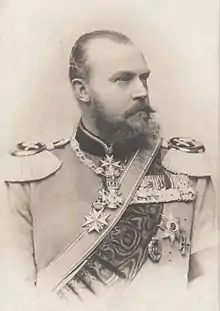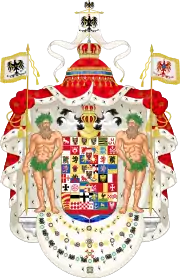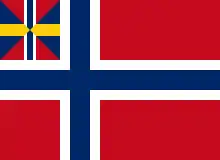Prince Albert of Prussia (1837–1906)
Prince Albert of Prussia (Friedrich Wilhelm Nikolaus Albrecht; 8 May 1837 – 13 September 1906) was a Prussian general field marshal, Herrenmeister (Grand Master) of the Order of Saint John from 1883 until his death, and regent of the Duchy of Brunswick from 1885, also until his death.
| Prince Albert | |||||
|---|---|---|---|---|---|
 | |||||
| Born | 8 May 1837 Berlin, Prussia | ||||
| Died | 13 September 1906 (aged 69) Kamenz | ||||
| Burial | |||||
| Spouse | |||||
| Issue | |||||
| |||||
| House | Hohenzollern | ||||
| Father | Prince Albert of Prussia | ||||
| Mother | Princess Marianne of the Netherlands | ||||
| Prussian Royalty |
| House of Hohenzollern |
|---|
 |
| Descendants of Frederick William III |
Biography
He was born in Berlin, the son of Prince Albert of Prussia (1809–1872) and his wife Princess Marianne (1810–1883), daughter of King William I of the Netherlands. His father was a brother of King Frederick William IV of Prussia and of William I, German Emperor.
Albrecht entered the Prussian army in 1847, serving in the First Schleswig War and participating in the battles of Skalitz, Schweinschädel and Königgrätz in the Austro-Prussian War in 1866. In the Franco-Prussian War in 1870 he commanded a guard cavalry brigade at Gravelotte and Sedan. After the fall of the Second Empire, he was subordinated to Edwin von Manteuffel in the fighting around Bapaume and St. Quentin. In 1874 he became commander of the X Corps stationed in Hannover. In 1883 he succeeded his uncle prince Charles as Herrenmeister of the Order of Saint John (Bailiwick of Brandenburg).
In 1885, Albert was chosen as Regent for the Duchy of Brunswick, as German Chancellor Otto von Bismarck had removed Ernest Augustus, Crown Prince of Hanover, from office.[1] In 1913 Ernst August's son Ernest Augustus, Duke of Brunswick became Duke of Brunswick who only reigned for 5 years and 6 days. After accepting the regency, Albert and Marie resided chiefly in Brunswick, Berlin, and Kamenz.[1]
Prince Albrecht died at Schloss Kamenz in 1906. He was buried in the Mausoleum auf dem Hutberge in the park of Schloss Kamenz. After World War II, the mausoleum was plundered and the bodies of Albert and his wife were reburied in the park.[2]
Marriage and issue
On 9 April 1873 in Berlin he married Princess Marie of Saxe-Altenburg (1854–1898), daughter of Ernst I, Duke of Saxe-Altenburg (1826–1908) and his wife Agnes of Anhalt-Dessau (1824–1897). Albert's parents had been unhappily married to each other and were later divorced. His decision to wait until he was 36 before marrying is thought to have been a reflection of his parents' marital situation.[3]
Their children were:
- Friedrich Heinrich (1874–1940), never married.
- Joachim Albrecht (1876–1939), married morganically, no issue
- Friedrich Wilhelm (1880–1925), married Princess Agathe of Hohenlohe-Waldenburg-Schillingsfürst, had 4 daughters
Honours and awards
- German honours[4]
.svg.png.webp) Prussia:
Prussia:
- Knight of the Black Eagle, with Collar
- Pour le Mérite (military), 19 September 1866; with Oak Leaves, 10 March 1871[5]
- Order of Merit of the Prussian Crown
- Grand Cross of the Red Eagle, with Crown, Oak Leaves and Swords
- Knight of the Prussian Crown, 1st Class
- Grand Commander of the Royal House Order of Hohenzollern
- Iron Cross, 1st Class
- Master of Knights of the Johanniter Order, 1883-1906
 Hohenzollern: Cross of Honour of the Princely House Order of Hohenzollern, 1st Class with Swords
Hohenzollern: Cross of Honour of the Princely House Order of Hohenzollern, 1st Class with Swords Ascanian duchies: Grand Cross of Albert the Bear, 29 November 1854; with Swords, 5 December 1864[6]
Ascanian duchies: Grand Cross of Albert the Bear, 29 November 1854; with Swords, 5 December 1864[6].svg.png.webp) Baden:
Baden:
- Knight of the House Order of Fidelity, 1856[7]
- Grand Cross of the Zähringer Lion, 1856[7]
- Commander of the Military Karl-Friedrich Merit Order, 1871[8]
.svg.png.webp) Bavaria: Knight of St. Hubert
Bavaria: Knight of St. Hubert Brunswick: Grand Cross of Henry the Lion, 1871[9]
Brunswick: Grand Cross of Henry the Lion, 1871[9].svg.png.webp)
.svg.png.webp)
.svg.png.webp) Ernestine duchies: Grand Cross of the Saxe-Ernestine House Order, 1855[10]
Ernestine duchies: Grand Cross of the Saxe-Ernestine House Order, 1855[10] Hesse-Kassel: Knight of the Golden Lion, 16 April 1853[11]
Hesse-Kassel: Knight of the Golden Lion, 16 April 1853[11] Hesse-Darmstadt: Grand Cross of the Ludwig Order, 6 May 1870[12]
Hesse-Darmstadt: Grand Cross of the Ludwig Order, 6 May 1870[12] Lippe-Detmold: Grand Cross of the House Order of Lippe
Lippe-Detmold: Grand Cross of the House Order of Lippe Mecklenburg:
Mecklenburg:
- Grand Cross of the Wendish Crown, with Crown in Ore
- Military Merit Cross, 1st Class (Mecklenburg-Schwerin)
 Oldenburg: Grand Cross of the Order of Duke Peter Friedrich Ludwig, with Golden Crown, 5 September 1850[13]
Oldenburg: Grand Cross of the Order of Duke Peter Friedrich Ludwig, with Golden Crown, 5 September 1850[13].svg.png.webp) Saxe-Weimar-Eisenach: Grand Cross of the White Falcon, 1869[14]
Saxe-Weimar-Eisenach: Grand Cross of the White Falcon, 1869[14].svg.png.webp) Saxony: Knight of the Rue Crown, 1854[15]
Saxony: Knight of the Rue Crown, 1854[15] Württemberg: Grand Cross of the Württemberg Crown, 1885[16]
Württemberg: Grand Cross of the Württemberg Crown, 1885[16]
- Foreign honours[4]
 Austrian Empire: Grand Cross of St. Stephen, 1852[17]
Austrian Empire: Grand Cross of St. Stephen, 1852[17].svg.png.webp) Belgium: Grand Cordon of the Royal Order of Leopold
Belgium: Grand Cordon of the Royal Order of Leopold_crowned.svg.png.webp) Kingdom of Italy: Knight of the Annunciation, 1889[18]
Kingdom of Italy: Knight of the Annunciation, 1889[18]
 Netherlands:
Netherlands:
- Commander of the Military William Order, 25 August 1878[19]
- Grand Cross of the Netherlands Lion
.svg.png.webp) Kingdom of Portugal: Grand Cross of the Tower and Sword
Kingdom of Portugal: Grand Cross of the Tower and Sword Kingdom of Romania: Grand Cross of the Star of Romania
Kingdom of Romania: Grand Cross of the Star of Romania Russian Empire:
Russian Empire:
- Knight of St. Andrew
- Knight of St. Alexander Nevsky
- Knight of the White Eagle
- Knight of St. Anna, 1st Class
- Knight of St. Stanislaus, 1st Class
- Knight of St. George, 4th Class
.svg.png.webp) Spain:
Spain:
- Knight of the Golden Fleece, 15 December 1891[20]
- Grand Cross of the Order of Charles III, with Collar, 15 May 1902[21]
.svg.png.webp)
 Sweden-Norway: Grand Cross of St. Olav, 3 September 1856[22]
Sweden-Norway: Grand Cross of St. Olav, 3 September 1856[22] United Kingdom:
United Kingdom:
Ancestry
References
- "Memorial Notices", The Manchester Guardian, 11 October 1898
- "Saxe-Altenburg". Royaltyguide.nl. Archived from the original on 26 May 2011. Retrieved 14 September 2010.
- "A Royal Marriage", The New York Times, Berlin, 7 May 1873
- Handbuch über den Königlich Preußischen Hof und Staat (1906), Genealogy p. 4
- Lehmann, Gustaf (1913). Die Ritter des Ordens pour le mérite 1812–1913 [The Knights of the Order of the Pour le Mérite] (in German). 2. Berlin: Ernst Siegfried Mittler & Sohn. p. 474.
- Hof- und Staats-Handbuch des Herzogtum Anhalt (1867) "Herzoglicher Haus-orden Albrecht des Bären" p. 17
- Hof- und Staats-Handbuch des Großherzogtum Baden (1873), "Großherzogliche Orden" pp. 34, 48
- Hof- und Staats-Handbuch des Großherzogtum Baden (1873), "Großherzogliche Orden" p. 64
- Braunschweig, Staat (Hg.) (1905): Hof- und Staatshandbuch des Herzogtums Braunschweig für 1905. In: Hof- und Staatshandbuch des Herzogtums Braunschweig 1905. p. 11
- Staatshandbuch für die Herzogthümer Sachsen-Coburg und Gotha (1865), "Herzogliche Sachsen-Ernestinischer Hausorden" p. 20
- Hessen-Kassel (1856). Kurfürstlich Hessisches Hof- und Staatshandbuch: 1856. Waisenhaus. p. 12.
- Hof- und Staats-Handbuch des Großherzogtum Hessen (1879), "Großherzogliche Orden und Ehrenzeichen" p. 12
- Hof- und Staatshandbuch des Großherzogtums Oldenburg0: 1879. Schulze. 1879. p. 32.
- Staatshandbuch für das Großherzogtum Sachsen / Sachsen-Weimar-Eisenach (1874), "Großherzogliche Hausorden" p. 14
- Staatshandbuch für den Freistaat Sachsen: 1865/66. Heinrich. 1866. p. 4.
- Hof- und Staats-Handbuch des Königreich Württemberg (1907), "Königliche Orden" p. 28
- "A Szent István Rend tagjai" Archived 22 December 2010 at the Wayback Machine
- Italia : Ministero dell'interno (1898). Calendario generale del Regno d'Italia. Unione tipografico-editrice. p. 54.
- "Militaire Willems-Orde: Preussen, Friedrich Wilhelm Nikolaus Albrecht Prinz von" [Military William Order: Prussia, Frederick William Nicholas Albert, Prince of]. Ministerie van Defensie (in Dutch). 25 August 1878. Retrieved 6 July 2020.
- "Caballeros de la insigne orden del toisón de oro", Guía Oficial de España (in Spanish), 1905, p. 143, retrieved 6 July 2020
- "Real y distinguida orden de Carlos III", Guía Oficial de España (in Spanish), 1905, p. 148, retrieved 4 June 2020
- Norges Statskalender (in Swedish), 1890, pp. 593–594, retrieved 2018-01-06 – via runeberg.org
External links
![]() Media related to Prince Albert of Prussia (1837–1906) at Wikimedia Commons
Media related to Prince Albert of Prussia (1837–1906) at Wikimedia Commons
Prince Albert of Prussia (1837–1906) Born: 8 May 1837 Died: 13 September 1906 | ||
| Preceded by Friedrich Carl Alexander, Prinz von Preußen |
Herrenmeister (Grand Master) of the Order of Saint John 1883–1906 |
Succeeded by Eitel Friedrich, Prinz von Preußen |
|}